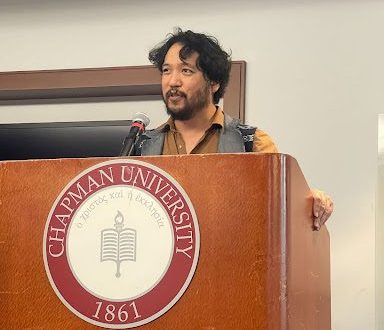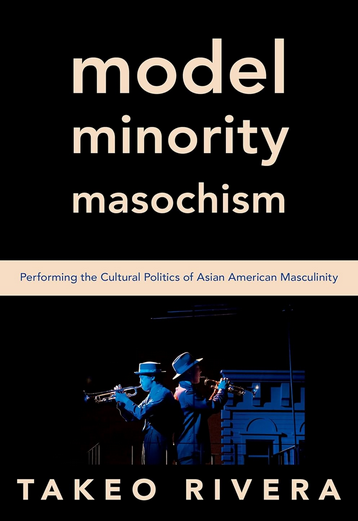
Gender, Race, and Masculinity Scholars Explore Intersectionality of Gender, Race, and Masculinity
November 20, 2024

Takeo Rivera (Boston University)
Drs. Quaylan Allen (Attallah College of Educational Studies), Rubin Espinoza (Interdisciplinary Programs), and Takeo Rivera (Boston University) offered rich and diverse perspectives for their panel discussion on Gender, Race, and Masculinity, as part of Wilkinson College of Arts, Humanities, and Social Science’s Engaging the World: Leading the Conversation on Gender & Sexuality series.
The panel’s comprehensive and nuanced discussion on the complexities of masculinity within different racial and ethnic contexts underscored the importance of considering multiple identities and the systemic factors that shape the experiences of men from diverse backgrounds.
In light of the election of Donald Trump as the 47th President of the United States the day before the event, each scholar offered insight into the growing popularity of Trump among all male demographics. Espinoza spoke specifically on how the structural inequalities that shape the experiences of Latinx men inform the ways in which they navigate challenges within their lives as well as decision making at the polls.
Panel moderator Dr. Renee Hudson (English) began the session with the poem “Instructions on Not Giving Up” from the United States Poet Laureate Ada Limón:
“… Patient, plodding, a green skin
growing over whatever winter did to us, a return
to the strange idea of continuous living despite
the mess of us, the hurt, the empty.”
The invited panelist then gave remarks on “the strange idea of continuous living despite” in relation to contemporary ideas and challenges of masculinity.
Dr. Allen’s research focuses on educational equity, racial justice, and the social outcomes for culturally diverse communities, with a particular emphasis on Black male educational success. Allen’s research highlighted the systemic barriers that Black males face in educational settings and the strategies they employ to achieve success despite these challenges.
By examining how race and gender intersect to influence the experiences of Black males in education, Allen’s work underscored the importance of considering shifting identities–both perceived and actual–in discussions about masculinity.
Dr. Espinoza’s research in social inequality, Latino/a and Latinx communities, migration, housing insecurity, and the food system provided a critical perspective on the experiences of Latinx individuals in the U.S. His work examines the social problems faced by low-wage workers, many of whom are from Latinx communities. Espinoza’s focus on social inequality and migration is particularly relevant to discussions on race and masculinity, factors that significantly impact the lives of Latinx men.
On the topic of the election, Esinoza reflected, “Ultimately, positive economic indicators such as GDP, unemployment rate, and stock market growth were insignificant for working class Latinos- a community that was devastated by Covid-19 and inflation when compared to more affluent groups. This proved particularly true for Latino men, who have lower college graduation rates than Latinas.”

Model Minority Masochism: Performing the Cultural Politics of Asian American Masculinity
Dr. Rivera’s work in performance studies, Asian American studies, ethnic studies, queer theory, and video game studies provided a multifaceted approach to understanding Asian American masculinity. His book, Model Minority Masochism: Performing the Cultural Politics of Asian American Masculinity, delves into the complexities of the model minority stereotype and its impact on Asian American men. Rivera explored how this stereotype creates a masochistic attachment to an ideal that is both empowering and oppressive, highlighting the ways in which Asian American men navigate their identities within a framework of masculinity that often dehumanizes them.
Rivera’s analysis of attachments to stereotypical forms of masculinity sheds light on the internalized pressures and expectations faced by Asian American men. After challenging the concept of a singular, idealized “masculinity,” Rivera then drew the connection between the online “incel” subculture of people (mostly white, male, and heterosexual) who define themselves as unable to find a romantic or sexual partner despite desiring one, and blame, objectify and denigrate women and girls as a result and how those demographics link to those most supportive of the Trump presidency.
This perspective was crucial for understanding how racial and gender identities intersect to shape the lived experiences of individuals.
The research of Rivera, Allen, and Espinoza collectively enriched the discourse on Gender, Race, and Masculinity by providing diverse and intersectional perspectives to a deeper understanding of how these identities intersect and influence each other.
(Photo header: (Left to right): Drs. Quaylan Allen (Attallah College of Educational Studies), Rubin Espinoza (Interdisciplinary Programs), Takeo Rivera (Boston University), and Dr. Renee Hudson (English)).

